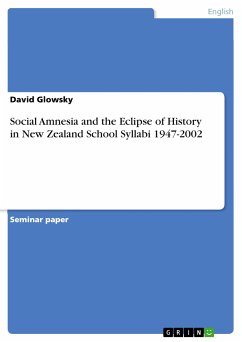Seminar paper from the year 2005 in the subject English Language and Literature Studies - Culture and Applied Geography, grade: bestanden, University of Cologne, course: Hauptseminar: The Orient and America, language: English, abstract: For more than a century Hollywood has depicted certain “others” as innately strange and dangerous. The popular caricature of the average Arab is as mythical as the old portrait of the Jew. He is robed and turbaned, sinister and dangerous, engaged mainly in hijacking airplanes and blowing up public buildings. From the earliest days of film on up to the present the image of the Arab as a villain has prevailed in most Hollywood productions He is what he has always been – the cultural “other”. The stereotypes are deeply ingrained in American cinema. Filmmakers have collectively indicted Arabs as public enemy number one – brutal, heartless, uncivilized religious fanatics terrorizing civilized Westerners. This paper argues for the existence of a genre of films termed the ‘eastern’ that deals with the Middle East. It will be shown that the kinds of images that are present in these films are more than just a random repetition of stereotypes. Films belonging to this genre share a number of character types, narrative elements and locale which will be dealt with in detail. Subgenres of the ‘eastern’ will then be identified and the connection between the formation of new subgenres and specific historical events or encounters will be worked out. Films being covered will range from as early as 1921 (The Sheik) up to the present. Due to the length of this paper I can only cover a very limited selection of films. Nevertheless, the films being dealt with will be representative for their genre and for their time so that in the end a chronological history of the stereotype should be established. I will not deal with films set in Asia, since they do seem to share a number of narrative elements with the ‘eastern’, but do not appear to form a specific generic tradition. Besides that, different historical experiences have influenced Western expectations about China, Japan and India.
Bitte wählen Sie Ihr Anliegen aus.
Rechnungen
Retourenschein anfordern
Bestellstatus
Storno









